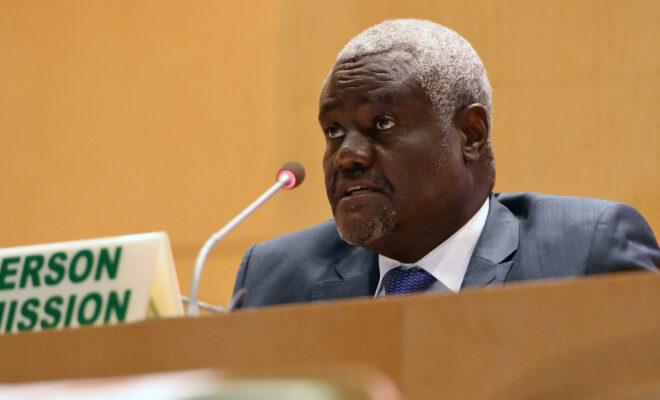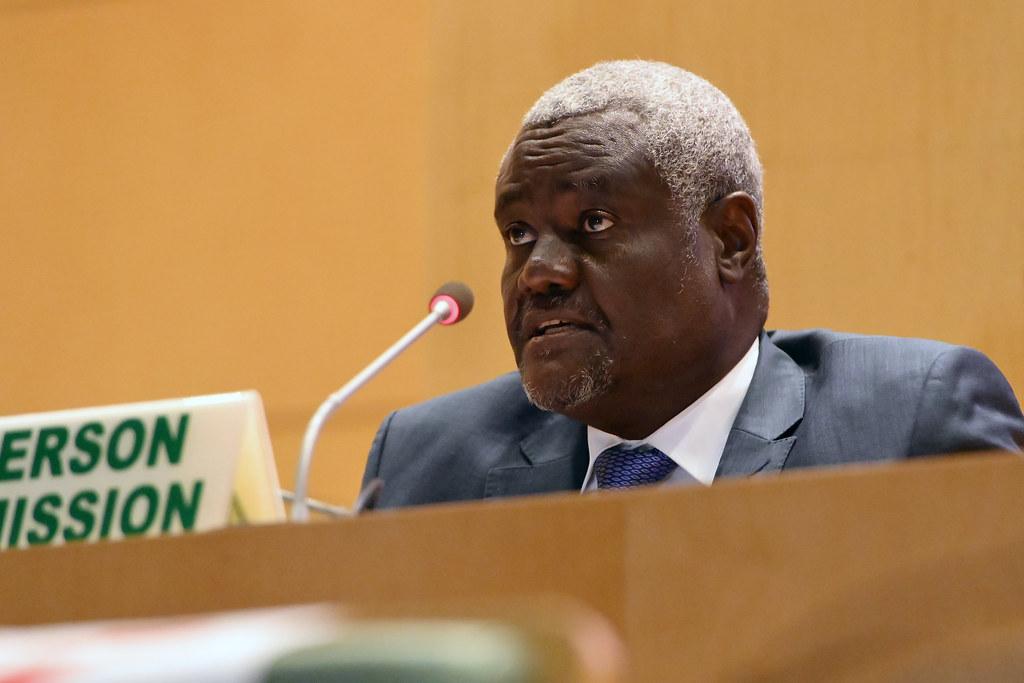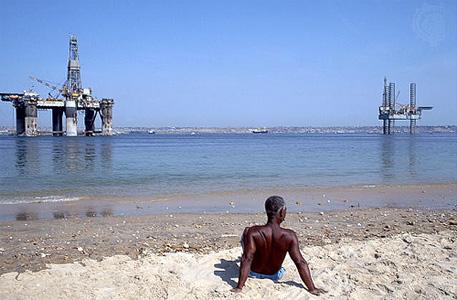How did Israel end up with AU observer status?

The Africa Union must recognise that the accreditation of an apartheid regime is incompatible with its values.

Moussa Faki Mahamat, Chairperson for the African Union Commission, speaks at the AU Summit in February 2022. Credit: Dean Calma / IAEA.
For at least the next year, Israel will continue to have observer status at the Africa Union (AU). This startling fact contradicts the values enshrined in the continental body’s Constitutive Act, which stands against apartheid and colonialism, and is in violation of the African Charter on Human and Peoples’ Rights.
Israel’s acceptance into the AU also defies the vehement wishes of a significant number of member-states, including South Africa, Nigeria, Algeria, Namibia, Botswana and Tunisia. Other African nations have stated their opposition to Israel’s accreditation both verbally and in writing.
The opposition to Israel having any status in the AU is linked to its treatment of Palestine. In 2021, Israel’s largest human rights group, B’Tselem, declared that Tel Aviv’s violent and supremacist policies towards Palestinians amounted to apartheid. Human Rights Watch and Amnesty International have since reached the same conclusion. South African anti-apartheid veterans like Archbishop Desmond Tutu, Kgalema Mothlanthe, Ronnie Kasrils and Winnie Mandela recognised this fact decades ago, while South Africa’s Human Sciences Research Council declared it in 2009.
In fact, almost 50 years ago, the AU’s predecessor, the Organisation for African Unity (OAU), noted the similarities between the Israeli and apartheid South African regimes. At a meeting of OAU heads of state in Uganda in 1975, the organisation declared: “the racist regime in occupied Palestine and the racist regime in Zimbabwe and South Africa have a common imperialist origin, forming a whole and having the same racist structure and being organically linked in their policy aimed at repression of the dignity and integrity of the human being”.
Last February, the AU condemned Israel for “its relentless pursuit of colonisation and annexation measures and [continuing] to act in bad faith and in total contradiction of ending the occupation.”
How and why then was Israel accorded observer status?
The AU divided
In July 2021, the AU Commission Chair, Moussa Faki Mahamat, made the unilateral decision to grant Israel observer status. Tel Aviv had been lobbying for this for 20 years.
The response was quick and direct. Many African countries denounced the decision. Activists from political, religious, and civil society across Africa, under the banner of the Pan-African Palestine Solidarity (PAPSN), began campaigning against Israel’s presence at the AU. Our message is simple: As a modern-day apartheid state and colonial power, Israel offends the AU’s ethos and cannot play any role in the organisation until it dismantles apartheid and ends its colonialism and occupation of Palestine.
This dispute came to a head at the AU summit this February. At a closed meeting of heads of states, participants discussed the matter. They agreed that Mahamat’s decision would be suspended and that a new committee would deliberate on whether Israel should be accredited. This committee would include three countries that opposed Israel’s accreditation – Algeria, Nigeria, and South Africa – and three that supported it – Cameroon, the Democratic Republic of Congo, and Rwanda. It would be chaired by the new AU chair, Senegal’s President Macky Sall.
This compromise was a principled and sensible decision reached through the AU’s preferred method of decision-making: consensus. It also helped avoid a split in the AU.
Yet, within hours, as a result of lobbying by Israel and its African supporters, several AU members insisted that the matter be reopened. After the new debate, President Sall declared that the new committee would consult member states and build consensus on the matter before a final decision, but he also reversed the earlier agreement to suspend Israel’s accreditation while the matter was pending. This means that pending the deliberations of the committee, Israel will maintain its AU observer status.
Principled opposition
The position of the African countries that oppose Israel’s accreditation is clear, but why have so many chosen to embrace the apartheid state?
One answer is that Israel has been increasingly muscular in its diplomatic offensive and offers of technological and agricultural support, particularly in West Africa and East Africa. Another answer lies in the fact that, in the last decade, Israeli military exports to the continent have increased by 306%. In recent years, several authoritarian regimes in Africa have also used Israeli spyware against their own citizens and even other African heads of state.
This highlights another worrying aspect of an AU embrace of Israel. Its acceptance does not only contradict the body’s principles, but also points to the growing reach of authoritarianism, surveillance, and oppression on the continent. The growing influence of the Israeli regime in several African states is a threat to those countries’ peace and democracy.
The seven heads of state on the new committee have the opportunity to uphold the values and principles of the AU as enshrined in the Constitutive Act and the African Charter, and that has long guided the Union on the issue of Israeli occupation and is critical of Zionism – the foundational ideology of Israel. They can, and must, oppose settler colonialism and apartheid, and support the liberation of the Palestinian people.







Israel is an apartheid state that is untrustworthy. Greed of some African leaders is what spoils the progress of the AU.
Africa should be supporting Palestine in every possible way.!! It must not, from my perspective, develop any kind of positive attitude towards Israel.
Please note I am a Hungarian-born Jew.
I truly hope The African UNION makes a decision that upholds the principles of peace and sovereignty for which it represents and they do NOT allow Israel, an apartied, genocidal OCCUPATION to oversee and monitor African progress. I am Rwandan and I am disappointed that Rwanda stands with Israel and I truly hope they make the right decision and denounce their support.
Furthermore, the mistreatment of African jews and Ethiopian immigrants should be indicative where the Israeli Occupation stands on African progress.
How could such a regime be allowed to monitor Africa’s progress?
Waste of resources and time. Israel is not in Africa, why does it need to have any status in the African union? They should focus on the matters in Africa, not on what Israel wants.
Have any other nations besides Haiti been afforded “observer status”?
Why exactly does Israel want to observe the AU? It is not in Africa and has nothing to do with AFrica? Why does it want to poke it’s nose where it does not belong?